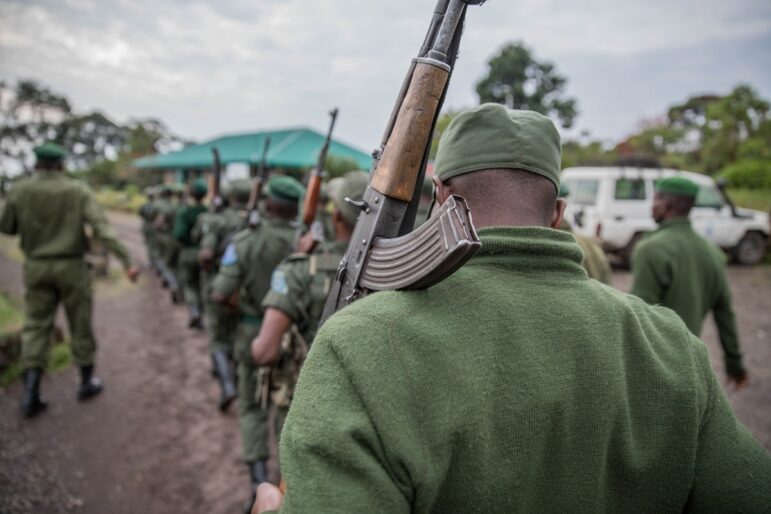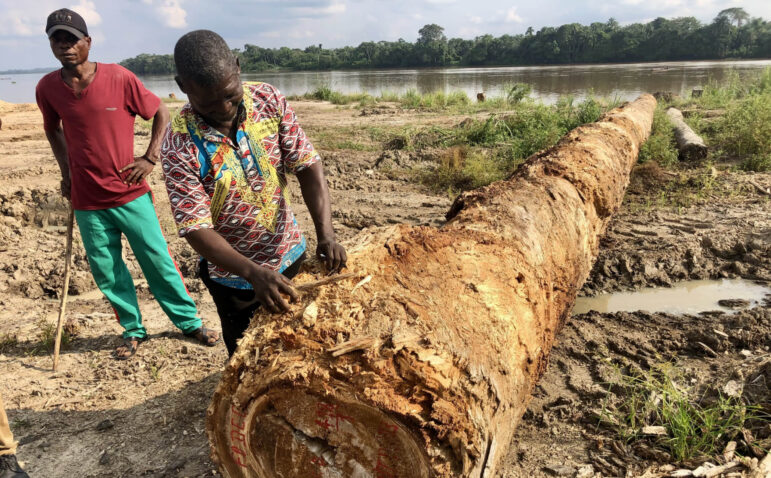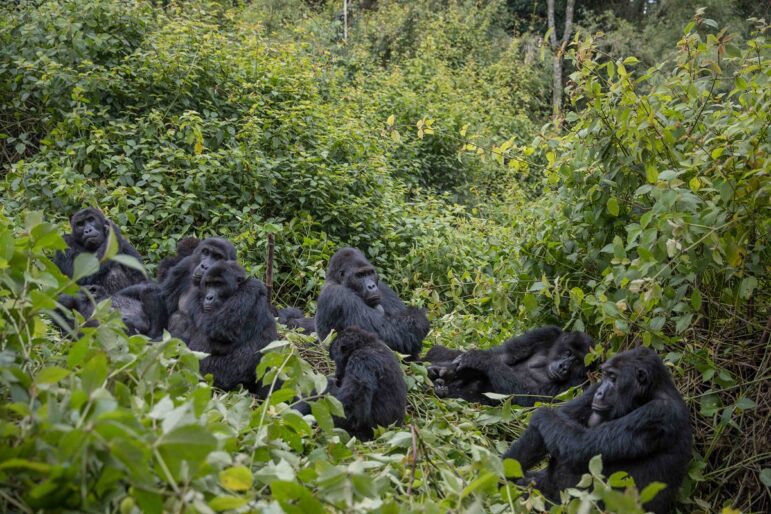Mongabay’s coverage has shone a light on pressing environmental and human rights issues across Africa, yielding actionable findings. Here are two examples of stories that demonstrate the impact of objective, factual reporting on the socio-economic threats facing the Congo Basin and Central Africa, unveiling a stark narrative of exploitation.
Spotlighting abuse against Indigenous group in DRC

Kahuzi-Biega National Park rangers stand in formation at the park in October, 2016. Photo by Thomas Nicolon for Mongabay.
In 2021, Mongabay published a report explaining that the number of attacks by security forces on Indigenous Batwa villages in the Democratic Republic of Congo’s (DRC) Kahuzi-Biega National Park had tripled in the last few weeks of the year, according to the Forest Peoples Programme. The DRC soldiers and park rangers were accused of burning several Batwa villages to the ground, killing one man and possibly a pregnant woman, and injuring at least two other women during raids that continued until mid-December.
As a result, Indigenous rights groups demanded a formal investigation into the reports, and called on park funders to pay attention to alleged crimes committed using their money. However, park officials denied the existence of any Batwa communities officially living inside the park, and say the target of the raids was an armed man that carried out a deadly attack in the city of Bukavu.
“Fortress conservation, where communities are separated from their ancestral lands to protect often-threatened biodiversity, is a recurrent issue Indigenous peoples and local communities are faced with,” says Mongabay editor for Indigenous news Latoya Abulu. “I often encounter allegations or evidence of human rights abuses by the armed rangers who patrol protected areas. At times, when a confrontation between a local community member entering a protected area (for reasons ranging from gathering food and medicine for their hungry family to taking part in an illegal logging trade) and an underpaid, poorly trained or corrupt ranger occurs, extreme violence ensues. Physical violence ranges from beatings and torture to murder.”
Chinese companies linked to illegal logging and mining in northern DRC

Decaying log sitting at the premises of Fodeco, a Chinese-owned logging company operating in Tshopo, DRC’s largest forest province. It is not profitable for the company to ship the logs unless they manage to extract enough of them from the forest. Photo by Gloria Pallares/El País.
In 2022, Mongabay partnered with EL PAÍS/Planeta Futuro to publish an investigation in English that found evidence of illegal extraction of endangered tree species, precious minerals and strategic metals headed for global markets. The investigation revealed that Chinese-owned companies use ‘complaisance’ permits to log and export CITES II-listed Afrormosia, which international demand pushed to extinction in other African countries, and flagged irregularities in the export quota. European countries would consider stricter measures on imports from the DRC. Military-protected concessionaires had been illegally mining gold, diamonds and rare metals with prospecting licenses for more than a year. They used mercury, a neurotoxic pollutant, in waters communities used to fish, bathe and drink.
Impact

A group of Grauer’s Gorillas in Kahuzi-Biega National Park in the DRC in late 2016. There are fewer than 4,000 of the gorilla subspecies left. Photo by Thomas Nicolon.
These stories have not just raised awareness, but have catalyzed significant real-world impacts, from influencing CITES authorities and EU import policies to informing human rights investigations. They underscore Mongabay’s role in not just reporting the news but sparking change.
In the case of Mongabay’s investigation into the links of a Chinese company to illegal logging and mining in northern DRC, it helped the Forestry Governance Observatory – the official independent auditor of logging concessions in the DRC – use the information to develop their reports on Chinese concessions. CITES authorities also used the report in their research to review EU imports from the companies named in the story. The story was also being used to inform an EU-funded investigation on the legality of forestry titles in the DRC, an initiative by the 12-donor group CAFI, which has pledged $500 million for the DRC forest conservation.
Likewise, in response to the Mongabay story on human rights abuses committed against Indigenous Batwa communities in Kahuzi-Biega National Park, the DRC was cited in a Minority Rights Group (MRG) investigation. Published in April 2022, the investigation quotes the Mongabay story and the abuses committed against park guards and an escalation of violence in the park. The investigation used the story to help establish a timeline of the abuses in the park, leading to a report titled: To Purge the Forest by Force: Organized violence against Batwa in Kahuzi-Biega National Park.
Future impactul reporting with Mongabay Africa
Looking ahead, Mongabay strives to persist in improving transparency and accountability throughout Africa, shares Abulu: “In light of global biodiversity targets looming close, like the “30 by 30” goal which may lead to the creation of more exclusionary protected areas, we want to make sure we continue to deliver quality, independent journalism that keeps track of these under-reported cases of violence and ensures that every allegation or life affected reaches our audience and policymakers.”
These two stories are but a few examples of the work that is to come, especially following the launch of Mongabay’s new bilingual news bureau, Mongabay Africa, to cover environmental and conservation news across the continent in French and English. This expansion aligns with Mongabay’s efforts to provide credible independent journalism, make science accessible, elevate voices impacted by environmental change, and serve a diverse audience with free news in various languages and formats.
Support independent environmental journalism
If you are interested in helping sustain impactful, independent news like this, there are two excellent ways you can do so with Mongabay. First, consider making a donation, which directly helps us continue to produce high-impact journalism from Nature’s frontline. Second, subscribe to Mongabay’s newsletter to get the latest environmental news delivered right to your inbox.
About Mongabay
Mongabay is a nonprofit environmental science and conservation news platform focused on providing cutting-edge independent journalism from Nature’s frontline. We pride ourselves on producing reporting that has substantial, tangible impacts around the world.